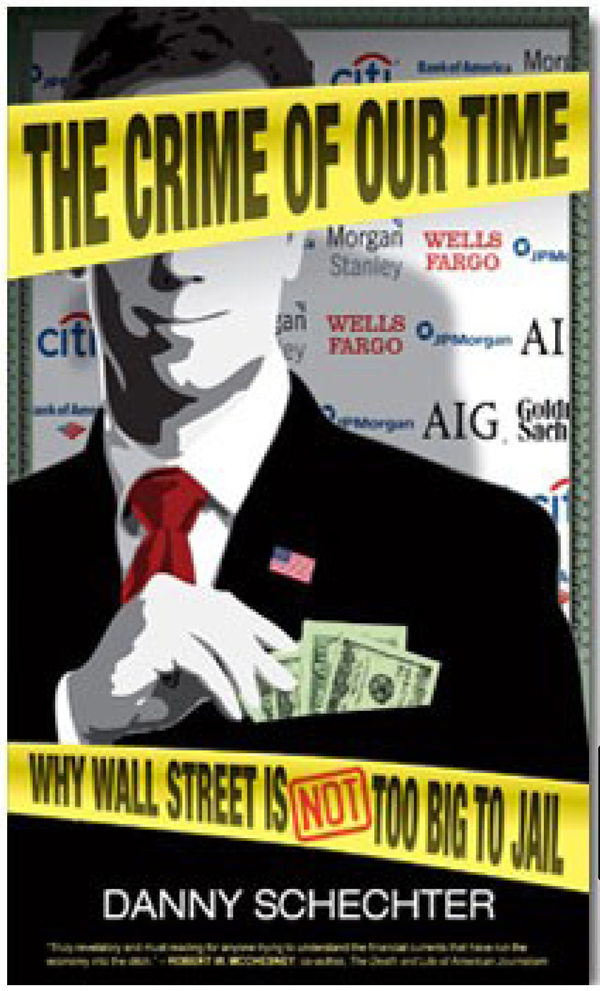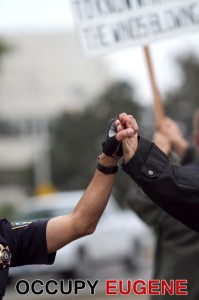Recently it has come to my attention that the global Occupations are being blamed for the disorderly behavior that is taking place at many of our protest sites. This is understandable, given that the power structure is hell bent on discrediting us by any means at their disposal. It is also laughable.
The problems we are facing were not created by us, but we deign to shed light on them and so we are blamed for them. The truth is, every person at our protest is there because the system is broken. If there were no occupations, the number of people experiencing homelessness would remain unchanged. If there were no occupations, there would remain on American streets over a million runaway youth. Every day, people would be assaulted on the street, overdose on drugs on the street, urinate, defecate, sleep, and die on the street. The only thing that has changed about these problems since the occupations began is that now people are paying attention to them.
There is no way to have a protest on the street without facing the problems of the street head on. These problems are studiously ignored by politicians and the public alike. As occupiers, we will not ignore them. This is both a matter of conscience and necessity. We believe that by facing them we can begin to create opportunities for these problems to be addressed.
The problems of the street are best understood by the people who live them. In Occupy Eugene, those people self identify as Street Families. They are a collection of close knit groups with unique cultures that are as complex and nuanced as any I’m aware of. I don’t know much about Street Family cultures, but one thing I’ve learned since the occupation started is that many of them are very suspicious of charitable strangers.
This makes sense, especially when we remember that one of society’s primary tools for maintaining the current order is belittlement. Many people and organizations take a paternalistic and insulting stance toward the homeless. Every act of charity comes with strings attached. Getting access to food, shelter and clothing is a traumatic and pride swallowing experience for the extremely poor.
Pride is a funny thing; even when we’re at the bottom of our luck, penniless, wracked by addiction, depression, stress, psychosis, or any combination of the above, our pride still drives us. To have it insulted still hurts.
Mark it down, too; this isn’t their fault. Very few people set out to become homeless. It is class warfare that drives people into homelessness. They are victims, collateral damage in the war to move all resources into the hands of the few and the powerful. And as with any self respecting power structure, ours is expert at blaming victims.
When we’re talking about the problems of the street, it’s not just about long term single homeless adults. There are over a million runaway youth in the United States. They come from all manner of backgrounds, and they are frequently victimized on the street. When the topic of street kids comes up, it’s hard to get away from the question of blame. Some people blame the kids. Some people blame the parents. I have a really hard time with all of this.
When I was a teenager, I ran away from my parents home. My parents are loving, compassionate people. They are far from perfect, as am I, and as is everyone else involved in this movement, this city, this world.
It would be dishonest to blame my parents for what happened then. It would be dishonest to blame myself. To the extent that there’s blame to lay (and to a large extent there’s not), I place it in the same blood stained hands that hold the brunt of the responsibility for our social problems. They are they hands of a broken system, and they are the hands would rather protect that broken system than fight for justice.
My running away was the product of a complex web of interactions involving a cast of players that extends far beyond my immediate family. Those interactions were mediated by a culture of domination, oppression, and intolerance. It is a culture that rushes to blame victims, yet somehow always fails to identify structural problems. It is a culture that insists upon personal accountability, while ignoring the context of personal stories.
The problems of the street won’t ever go away until we address their structural root causes. The occupation is addressing those root causes. We are addressing the systematic inequalities that lead to homelessness, to runaway youth, to widespread substance abuse, and to untreated mental illness. We are directly addressing a civilization that refuses to treat its people when they are sick, and instead casts them out into the street.
These problems are not new. We did not cause them. We have, however, brought them together into one place. In doing so we have brought them into the light. This has been uncomfortable for use. It is never pleasant to face one’s problems, but if we wish to address them – both symptomatically in the short term, and by eliminating their cause in the long term – we must first be willing to look at them.
This is a real issue of personal accountability. We must each be accountable to ourselves to think realistically about unpleasant realities. As long as the occupation is on the street, we will live with the problems of the street. The street is the last refuge for honest people in a civilization built on lies. The street is where our toxic society sends the people it deems disposable to die slow deaths. The street is the site of the greatest inequalities and the greatest injustices of our age.
We, as members of this society, must hold ourselves accountable to refugees of our economic system and work with them compassionately. We must hold ourselves accountable to empower the powerless, and to never dehumanize or objectify someone on account of their economic status, their mental health status, their addiction status, or any other account.
This is not a distraction from our cause. It is our cause, as much as any direct action. If we ignore the issues of the street, they will overtake and subsume us, and rather than being the heroes of the movement we, too, will become its victims. If we can succeed in addressing the issues of the street, while also addressing the issues of Wall Street, we will change the course of history.
-Samuel Rutledge






